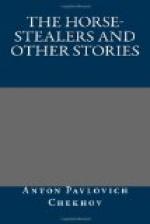“So this is real life,” thought Andrey Yefimitch, and he felt frightened.
The moon and the prison, and the nails on the fence, and the far-away flames at the bone-charring factory were all terrible. Behind him there was the sound of a sigh. Andrey Yefimitch looked round and saw a man with glittering stars and orders on his breast, who was smiling and slyly winking. And this, too, seemed terrible.
Andrey Yefimitch assured himself that there was nothing special about the moon or the prison, that even sane persons wear orders, and that everything in time will decay and turn to earth, but he was suddenly overcome with desire; he clutched at the grating with both hands and shook it with all his might. The strong grating did not yield.
Then that it might not be so dreadful he went to Ivan Dmitritch’s bed and sat down.
“I have lost heart, my dear fellow,” he muttered, trembling and wiping away the cold sweat, “I have lost heart.”
“You should be philosophical,” said Ivan Dmitritch ironically.
“My God, my God. . . . Yes, yes. . . . You were pleased to say once that there was no philosophy in Russia, but that all people, even the paltriest, talk philosophy. But you know the philosophizing of the paltriest does not harm anyone,” said Andrey Yefimitch in a tone as if he wanted to cry and complain. “Why, then, that malignant laugh, my friend, and how can these paltry creatures help philosophizing if they are not satisfied? For an intelligent, educated man, made in God’s image, proud and loving freedom, to have no alternative but to be a doctor in a filthy, stupid, wretched little town, and to spend his whole life among bottles, leeches, mustard plasters! Quackery, narrowness, vulgarity! Oh, my God!”
“You are talking nonsense. If you don’t like being a doctor you should have gone in for being a statesman.”
“I could not, I could not do anything. We are weak, my dear friend . . . . I used to be indifferent. I reasoned boldly and soundly, but at the first coarse touch of life upon me I have lost heart. . . . Prostration. . . . . We are weak, we are poor creatures . . . and you, too, my dear friend, you are intelligent, generous, you drew in good impulses with your mother’s milk, but you had hardly entered upon life when you were exhausted and fell ill. . . . Weak, weak!”
Andrey Yefimitch was all the while at the approach of evening tormented by another persistent sensation besides terror and the feeling of resentment. At last he realized that he was longing for a smoke and for beer.
“I am going out, my friend,” he said. “I will tell them to bring a light; I can’t put up with this. . . . I am not equal to it. . . .”
Andrey Yefimitch went to the door and opened it, but at once Nikita jumped up and barred his way.
“Where are you going? You can’t, you can’t!” he said. “It’s bedtime.”
“But I’m only going out for a minute to walk about the yard,” said Andrey Yefimitch.




